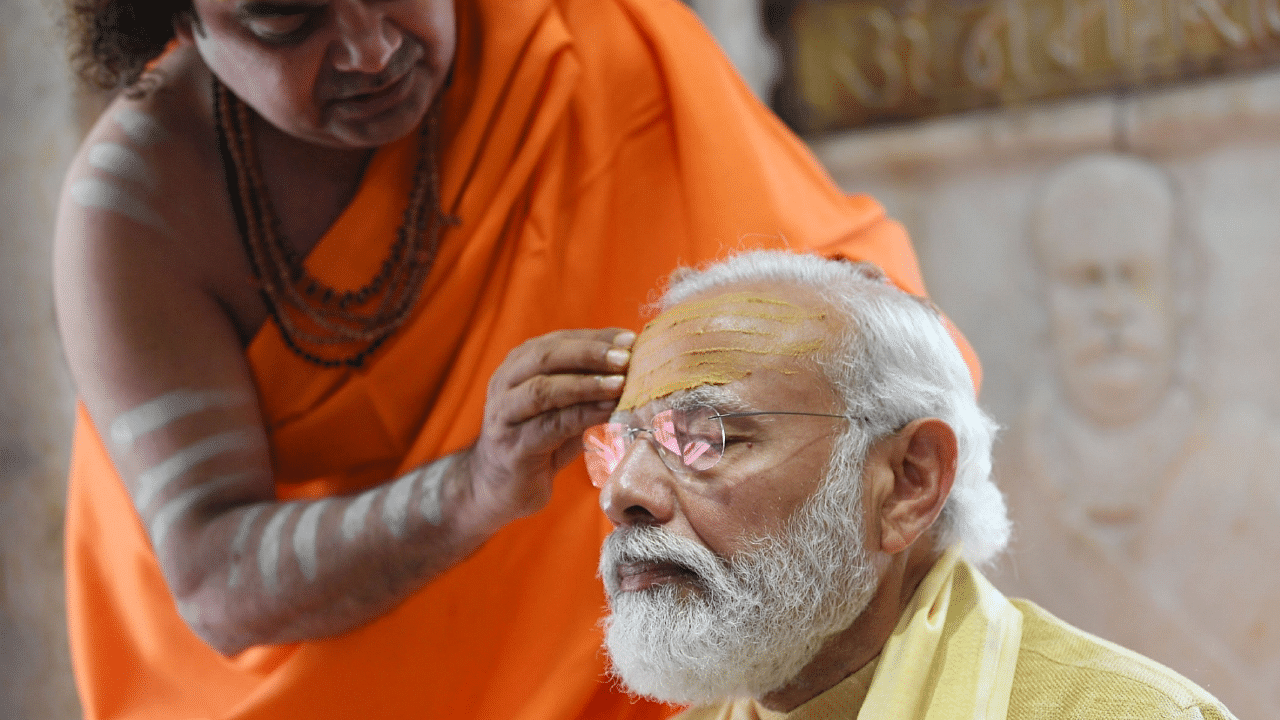
The gods must be amused. Come election time and political leaders scramble to visit temples, vying with each other in the anxiety to be seen as devout human beings (read Hindus). The ruling party has made a fine art of basing their politics on religion; scaling up ‘Hindutva’ to Himalayan heights, bringing secularism to an abysmal low.
The other parties are not far behind. The coming elections in Uttar Pradesh have triggered a frantic sprint, left, right and centre, from politicians of all hues to worship at Hindu shrines, an unrelenting frenzied charge that completely outstrips Tennyson’s Light Brigade. With apologies to the great poet: Theirs not to reason why – theirs but to follow the ‘Hindutva’ cry.
Before going further on ‘Hindutva’ and elections, and the impunity of public figures falling foul of the Constitution, one needs to talk about secularism in India, and the connecting electoral law.
There’s a perception that being secular necessitates a rejection of traditions, religious principles. Not so. In the Indian perspective, there’s due reverence for the great faiths and beliefs emanating from our land. Articles 25 to 28 of the Constitution provide for freedom of religion. However, the Indian State is constitutionally bound to be secular, to be religiously neutral.
Sarvepalli Radhakrishnan put it succinctly: “Secularism does not mean irreligion. It means we respect all faiths and religions. Our State does not identify itself with any particular religion.”
Thus, it is anathema for political parties to play the religious card. It is significant to refer to the Representation of the People Act, 1951 (RPA), and the relevant provision to uphold secularism in the electoral sphere. Section 123 (3) of the RPA states that an appeal by a candidate, or his agent “…to vote or refrain from voting for any person on the ground of his religion, race, caste, community or language...” would amount to a “corrupt practice”.
In January 2017, a seven-judge Constitution Bench of the Supreme Court, interpreting the above-mentioned provision, held that any appeal on the basis of religion, race, caste, etc., “would constitute a corrupt practice.” (Abhiram Singh v CD Commachen).
The court stated, among other things, “…The elections to the state legislature or to the Parliament…is a secular exercise...the constitutional ethos forbids the mixing of religions or religious considerations with the secular functions of the State.”
Regarding elections and the interpretation of ‘Hindutva’, whether it’s a “way of life” or pertains to the Hindu religion, the Supreme Court, in 1995, in the Manohar Joshi case (the ‘Hindutva judgement’), held that “…it is the context and the manner of its use which is material for deciding the meaning of the word ‘Hindutva’ in a particular text.”
Justice JS Verma’s decision still holds the field, leaving political groups to use the judgement to suit their self-serving ends.
To come back to Uttar Pradesh, campaigning is already in full swing, long before the election schedule is announced. What’s the clarion call to voters? Not roti, kapda, makaan, internet, or vaccination. Not social justice. No, the bugle is loud and clear, calling for the ‘Hindu’ vote. The BJP set the ball rolling with the Bhoomi Puja for the Ram Mandir in Ayodhya in 2019, setting up the template for electioneering on religious grounds. The agenda was transparent. ‘Hindutva’ all round. And Mathura-bound.
The other parties, with no minds or platforms, or spines of their own, follow dumbly, like sheep.
We have Priyanka Gandhi Vadra take off on sudden devotional yatras, landing up at various temples in UP, performing puja, perceivably not for her inner soul, but for the television cameras. Rahul Gandhi, too, takes great pains to project himself as a devout Hindu, frequenting shrines in Jammu, UP, Karnataka, and other election areas. Mamata Banerjee, chanting verses from the Chandipath. Arvind Kejriwal scurries to Ayodhya, carrying out elaborate rituals (AAP jaisa Ayodhya mein aaye…toh vote ban jaaye?!)
Yes, a politician has every right to practice his faith. Nonetheless, there’s a constitutional obligation for public authorities to uphold secular practices, and abstain from wearing their religion on their sleeves.
Technically, Section 123 (3) of the RPA doesn’t prohibit electoral candidates from worshipping at sacred places. The prohibition is on ‘appealing’ for votes on religious grounds. For example, a candidate is forbidden from saying: “I am a Hindu, therefore you, as a Hindu, vote for me…”
Nevertheless, the People’s Representatives are visibly breaking the spirit of the law, and unabashedly negating secular practices. As Justice JS Verma explained in the ‘Hindutva’ judgment: “…it is the context and the manner of its use which is material…”
In dashing to Hindu temples in election time, the message is loud and clear: “See how devout a Hindu I am…vote for me...”
Yet, there is hope that the electorate, desperate for improvement in their lives, will see through the disingenuous campaigning, the comical scenes of party leaders hopping from one temple to another, of posturing piousness, and reject the sectarian appeals!
Incidentally, I am a Hindu, brought up on, among other things, the inspiring epics, Ramayana and Mahabharata. Rama was the epitome of Dharma. Devotion to the people was the mantra in his Ayodhya.
Prime Minister Narendra Modi has upped the ante on public performance of temple worshipping. Seen recently at the Kedarnath temple, ahead of the Uttarakhand polls early next year, and then in full “aarti” flow in Kashi, in Uttar Pradesh!
Ironically, he has himself stated that “service to the people is the highest form of worship”. Exactly so. The PM and every public servant must walk the talk, eschew grandiose shows of temple rituals, and kneel down to worship at the altar of secularism. Serving one and all should be the electoral call.
(The writer is a Bengaluru-based lawyer)
Check out the latest DH videos here: